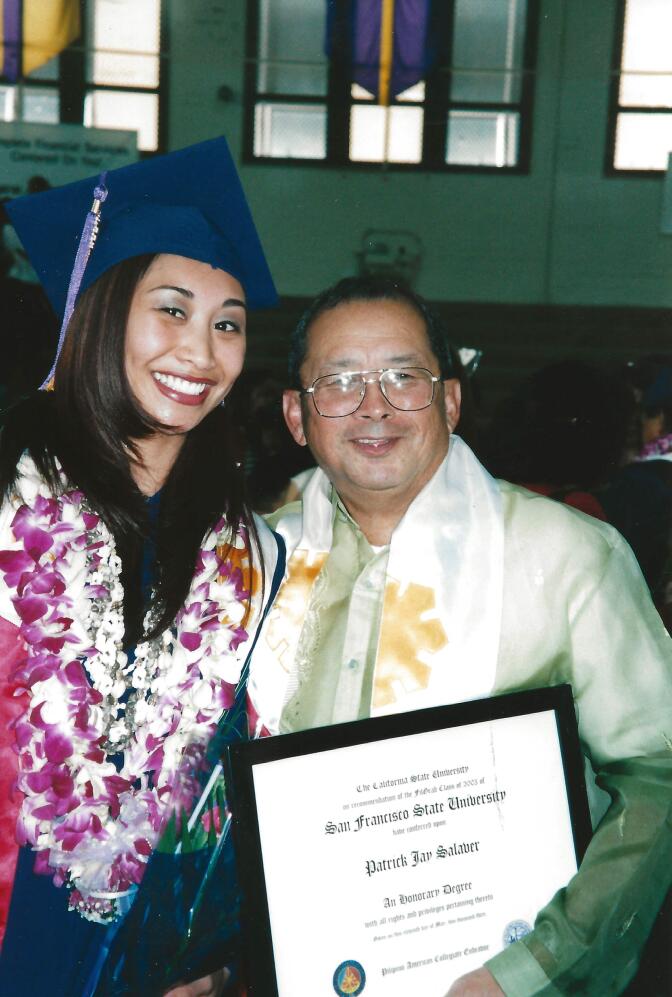This story is free to read because readers choose to support LAist. If you find value in independent local reporting, make a donation to power our newsroom today.
This Filipino student leader changed higher education. You probably don’t know his name

Nicole Salaver’s uncle, Patrick Salaver, was one of the leaders behind the Third World Liberation Front at San Francisco State University in the late 1960s. This movement ultimately brought ethnic studies programs to colleges nationwide. Despite his role as a Filipino civil rights leader, Patrick Salaver is largely unknown by the public. On episode 9 of Inheriting, Nicole Salaver sets the record straight and honors her uncle’s legacy, while building her own.
Meet Nicole Salaver
Nicole Salaver is an artist and filmmaker. She’s also a program manager at Balay Kreative, a studio that provides financial support and workspaces for Filipino artists in the San Francisco Bay Area. Her uncle Patrick Salaver helped to raise her and fostered her love for arts and culture.
What is 'Inheriting'?
Inheriting is a show about Asian American and Pacific Islander families, which explores how one event in history can ripple through generations. In doing so, the show seeks to break apart the AAPI monolith and tell a fuller story of these communities. Learn more at LAist.com/Inheriting
“He basically took me in and was like a second father,” Nicole Salaver says. “When I realized I wanted to be an actress, it was a lot because of my uncle Pat. He gave me (my first) VHS camera, and (through that) I got to act for the first time. I got to direct for the first time and write.”
Patrick Salaver’s superpower was storytelling. He would tell his niece countless tales about his past, but growing up, Nicole Salaver never paid much attention. It wasn’t until she got to college and took a Filipino American history class at SF State that she finally understood. Her uncle had once led a movement that transformed higher education and paved the way for ethnic studies programs in colleges nationwide.

A Brief History of Pat Salaver and the Third World Liberation Front
In the late 1960s, Patrick Salaver was a student at SF State – with a front row seat to an era of political change: the convergence of the Civil Rights Movement with protests against the Vietnam War and the establishment of the Black Panther Party in Oakland, Calif.
But rather than remain a bystander, Patrick Salaver got involved. Student groups at SF State, led by racial and ethnic minorities, were waging their own battles against the college administration. Organizations known then as the Black Students Union, the Latin American Students Organization, El Renacimiento, and the Philippine American Collegiate Endeavor, which Patrick Salaver co-founded, came together to form the Third World Liberation Front. Among their demands, the coalition called on the administration to admit more students of color to the school and to implement a college of ethnic studies.
The stakes were high. The war in Vietnam raged on. A disproportionate number of men of color were being sent overseas to fight. Patrick Salaver and his fellow organizers knew that college enrollment could protect men of color from the draft

“This is the tenth year of our participation in the war in Southeast Asia, and it has been clear for some time to many that it was wrong,” Patrick Salaver would later write.
He and his fellow students participated in a violent, months-long student strike – the longest in U.S. history. While it ultimately led to some major wins, Patrick Salaver’s activism and refusal to report for induction into the military took a toll on his personal life. It’s a legacy that Nicole Salaver wants to honor, by making a feature film about her uncle.
“It's my life's mission … to have his story out there so that other Asian Americans and just Americans in general can see the importance and sacrifice that my uncle laid his life for,” Nicole Salaver says.
How can I listen to more of this story?
Hear Episode 9 of Inheriting:
New episodes of “Inheriting” publish every Thursday wherever you get your podcasts and on LAist.com/Inheriting.









